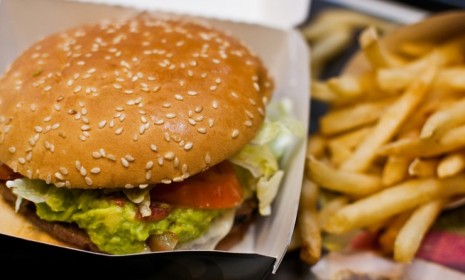Does fast food cause brain damage?
Burgers and fries might not only be bad for your heart and waistline — they could also hamstring your brain's ability to help you shed pounds

A free daily email with the biggest news stories of the day – and the best features from TheWeek.com
You are now subscribed
Your newsletter sign-up was successful
It's no surprise that eating fast food is bad for you. But just how bad? Recent studies suggest unhealthy foods can actually scar your brain. Here's what you should know:
Brain damage? Seriously?
Yes. According to a study recently published in The Journal of Clinical Investigation, fatty foods damaged the hypothalamus region of the brain in rodents. The hypothalamus produces hormones that control hunger, thirst, sleep, moods, and the natural rhythms of the body.
The Week
Escape your echo chamber. Get the facts behind the news, plus analysis from multiple perspectives.

Sign up for The Week's Free Newsletters
From our morning news briefing to a weekly Good News Newsletter, get the best of The Week delivered directly to your inbox.
From our morning news briefing to a weekly Good News Newsletter, get the best of The Week delivered directly to your inbox.
How was the study conducted?
Rats and mice were fed a high-fat diet similar to that of many Americans. After just one day, their hypothalamuses were inflamed. After a week, the rodents' brains activated cells to repair damaged areas, and the inflammation went away. But weeks later, the inflammation returned, and persisted for eight months, when the study ended. "This is radically different [thinking] — that diets can actually re-program the structure of the brain," says Dr. Steven R. Smith, a doctor uninvolved with the study.
What does this mean for me?
It could explain why it's so hard to lose weight and keep it off, says the study's lead author, Dr. Michael Schwartz. Rodents on the high-fat diet saw a 25 percent decline in a special kind of cell devoted to regulating appetite and fat control. The brain of a healthy, slim person seems to regulate how much food is stored as fat. But when someone is obese, his brain seems programmed to keep him at that weight permanently. These new findings seem to confirm that when we have unhealthy diets, "we're not in control as much as we think we are," says Smith.
A free daily email with the biggest news stories of the day – and the best features from TheWeek.com
But are rodent brains really like human brains?
Not necessarily. Researchers need to determine if the scarring observed in rodent brains applies to human brains.
Have other studies found similar things?
Yes. Another new study, published in the current issue of Neurology, found that eating fast food is related to the shrinkage of the brain that leads to Alzheimer's. Researchers suspect that just as the trans fats regularly found in fast food harden the arteries and impair heart function, they hurt the brain as well.
Sources: The Canadian, CNN, MedlinePlus, NPR
-
 6 exquisite homes with vast acreage
6 exquisite homes with vast acreageFeature Featuring an off-the-grid contemporary home in New Mexico and lakefront farmhouse in Massachusetts
-
 Film reviews: ‘Wuthering Heights,’ ‘Good Luck, Have Fun, Don’t Die,’ and ‘Sirat’
Film reviews: ‘Wuthering Heights,’ ‘Good Luck, Have Fun, Don’t Die,’ and ‘Sirat’Feature An inconvenient love torments a would-be couple, a gonzo time traveler seeks to save humanity from AI, and a father’s desperate search goes deeply sideways
-
 Political cartoons for February 16
Political cartoons for February 16Cartoons Monday’s political cartoons include President's Day, a valentine from the Epstein files, and more